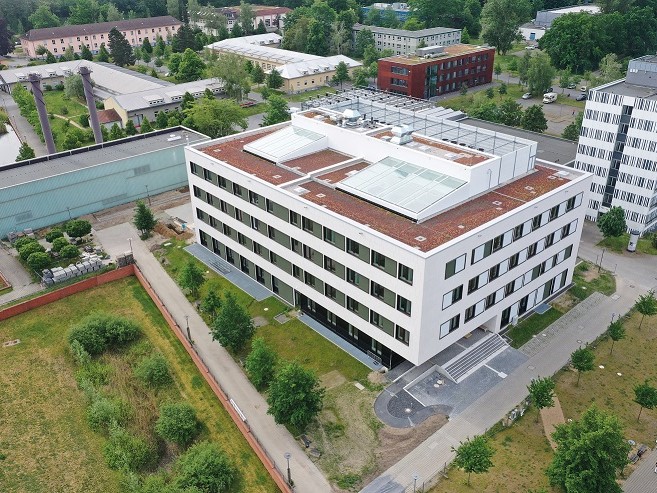University of Potsdam - Space for science and business

A new research building is being constructed on the Golm campus of the University of Potsdam with space for the research and technology centre “Earth & Environment Centre” (EEC) and the “Centre for Natural Product Genomics” (NSG). This is where science and business will meet in the future.
The construction of the new three-storey research building with a basement, which is located next to the University Library of the University of Potsdam was funded by the European Regional Development Fund (ERDF) and the State of Brandenburg. It offers enough space for the centres of the EEC and NSG. The jointly used building has state-of-the-art equipment, the newest laboratory and work rooms with the highest technical standards and a large foyer for events. Despite the close proximity, the centres are engaged in different exciting fields of research.
Earth & Environment Centre (EEC)
The consequences of climate change and human intervention in nature are especially noticeable in Brandenburg. Changes in dry periods and extreme precipitation, for example, have far-reaching effects on nature and society – this is where robust data and information are needed. For example, which trees and vegetation can survive in this region in the future? How and where do heavy rainfall events lead to local flooding? The EEC Research and Transfer Centre for Earth and Environmental Sciences tries to answer these questions locally but also globally. It focuses on interdisciplinary methods, applications and technologies of data analysis, modelling and visualisation. Technologically, the centre will focus on geodata analysis methods, software and sensor development, environmental monitoring services and new geovisualisation and communication methods.
Centre for Natural Product Genomics (NSG)
Plants and microorganisms produce an immense number of different substances. Medicinal plants have therefore played an important role in maintaining or restoring human health for centuries. The NSG uses state-of-the-art genome research technologies to identify new plant and microbial ingredients with health-promoting effects. These are to be used for the development and production of new medicinal active substances of plant origin. Due to the new research centre the excellent expertise in plant genome research and microbial natural product research available at the Potsdam-Golm site can be specifically transferred into innovative products of relevance to the health industry. This also offers excellent opportunities for spin-off companies in the field of biotechnological production of complex plant-based active substances in microorganisms.
For further information, visit www.uni-potsdam.de
The construction of the new three-storey research building with a basement, which is located next to the University Library of the University of Potsdam was funded by the European Regional Development Fund (ERDF) and the State of Brandenburg. It offers enough space for the centres of the EEC and NSG. The jointly used building has state-of-the-art equipment, the newest laboratory and work rooms with the highest technical standards and a large foyer for events. Despite the close proximity, the centres are engaged in different exciting fields of research.
Earth & Environment Centre (EEC)
The consequences of climate change and human intervention in nature are especially noticeable in Brandenburg. Changes in dry periods and extreme precipitation, for example, have far-reaching effects on nature and society – this is where robust data and information are needed. For example, which trees and vegetation can survive in this region in the future? How and where do heavy rainfall events lead to local flooding? The EEC Research and Transfer Centre for Earth and Environmental Sciences tries to answer these questions locally but also globally. It focuses on interdisciplinary methods, applications and technologies of data analysis, modelling and visualisation. Technologically, the centre will focus on geodata analysis methods, software and sensor development, environmental monitoring services and new geovisualisation and communication methods.
Centre for Natural Product Genomics (NSG)
Plants and microorganisms produce an immense number of different substances. Medicinal plants have therefore played an important role in maintaining or restoring human health for centuries. The NSG uses state-of-the-art genome research technologies to identify new plant and microbial ingredients with health-promoting effects. These are to be used for the development and production of new medicinal active substances of plant origin. Due to the new research centre the excellent expertise in plant genome research and microbial natural product research available at the Potsdam-Golm site can be specifically transferred into innovative products of relevance to the health industry. This also offers excellent opportunities for spin-off companies in the field of biotechnological production of complex plant-based active substances in microorganisms.
For further information, visit www.uni-potsdam.de

